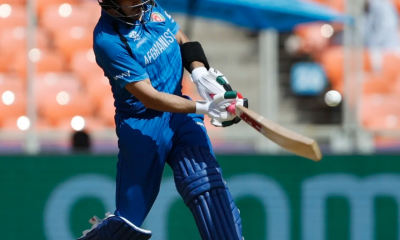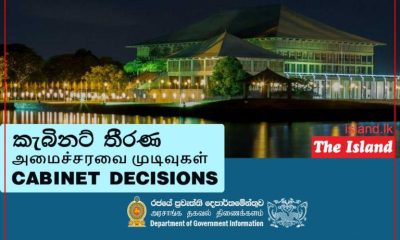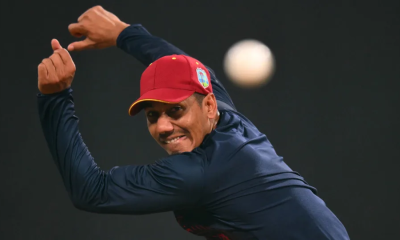News
Govt. urged to prevent interested parties from undermining bilateral relations
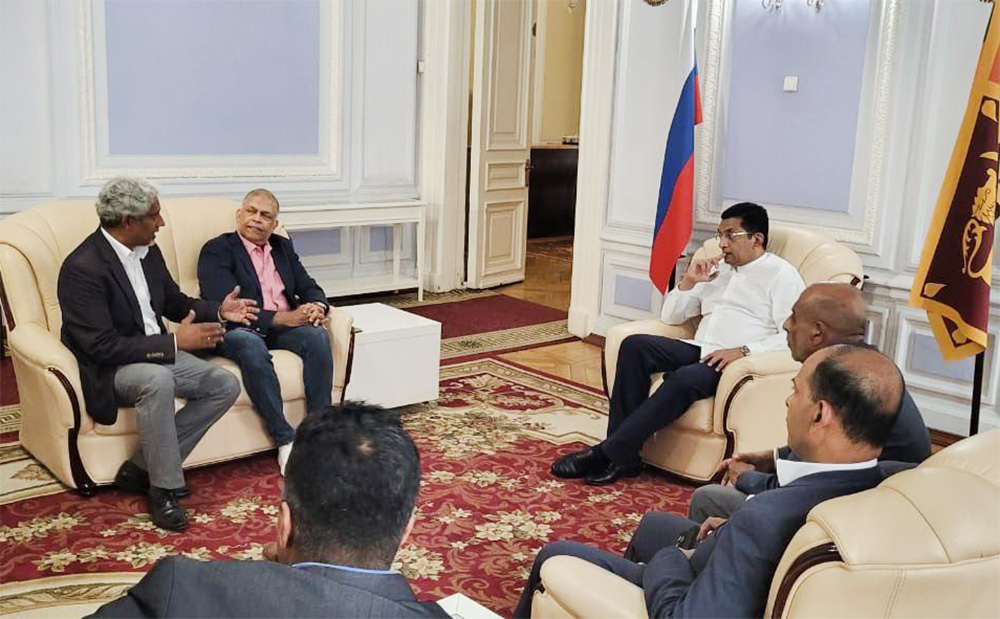
Defence Secretary Gunaratne in Moscow for talks
Ex-military men serving Russia:
By Shamindra Ferdinando
A group of Sri Lankans recently urged Foreign Minister Ali Sabry, PC, not to allow interested parties to exploit the ex-military personnel serving with the Russian military to cause a rift between the two countries.
The request was made when the group, based in Russia, met Minister Sabry at the Sri Lankan Embassy at No 24 Schepkina Street, Moscow.
The President of the Sri Lanka-Russia Business and Professionals Society, Jagath Chandrawansa, who had been among the group that met Minister Sabry, told The Island that the government should be mindful of the developing situation as Russia battled the combined Western powers engaged in the war in Ukraine.
Chandrawansa appreciated the willingness on the part of Minister Sabry to meet the delegation, at short notice, following a request made through Chargé d’Affaires P.M. Amza.
Chandrawansa said that they had opportunities to speak with military personnel, including some of those who had been wounded in Ukrainian attacks, before making representations to Minister Sabry. The Foreign Minister was returning home, via Moscow, after having attended the BRICS Foreign Ministers’ meeting in Nizhny Novgorod, Russia at the invitation of his counterpart, Sergey Lavrov.
The BRICS meeting was attended by high level representatives of 22 countries, including 17 Foreign Ministers.
“We were able to bring the entire range of issues to the Minister’s attention though it was a short meeting,” Chandrawansa, a long-standing resident of Moscow, told The Island.
Against the backdrop of the issue at hand, Sri Lanka should re-examine the status of bilateral relations with Russia anew, Chandrawansa said. Responding to a query, Chandrawansa pointed out that since 2010 the vital mission had been headed by political appointees. Referring to the importance of the mission in Moscow, Chandrawansa said that successive governments overlooked the shortcomings therein for obvious reasons.
Members of the war-winning ex-military joining the Russian war effort, subsequent deaths of some personnel, injuries suffered by many, and the absence of proper procedure in the payment of salaries, as well as compensation, caught the mission in Moscow by surprise, Chandrawansa asserted. But what made a bad situation worse was nothing but the overall absence of a national agenda in respect of foreign and defence relations at any level, Chandrawansa said.
At the onset of the meeting, Minister Sabry has explained their inability to influence and control reportage of the issue in local media, but urged the Russia–based group to set the record straight. They have agreed that unless tangible measures were taken to counter what he called destabilization efforts, anti-Russian sentiments could be instilled. That could have had a catastrophic impact on the large number of Russian tourists vacationing in Sri Lanka, Chandrawansa said, declaring that the country, still desperately struggling on the economic front, couldn’t afford to lose Russian tourists.
The delegation included Sanath Abesekera, Janaka Wijesuriya, Bernard Ramesh and Amila Kanchana.
During the course of the discussion, the Russia-based group reminded Minister Sabry of the disastrous consequences of detention of SU 289 flight at the Bandaranaike International Airport (BIA) on June 2, 2022, over a complaint filed by Ireland’s Celestial Aviation Trading Limited leasing company against Aeroflot.
Russia resumed flights after a lapse of four months after Sri Lanka assured there wouldn’t be a repetition.
Chandrawansa said that our relations with the Russian Federation were at a crossroads. Unfortunately, the government and the Parliament hadn’t paid sufficient attention to the pivotal importance of relations with Russia.
“Our ex-military personnel have ended up with both Russian and Ukrainian militaries. There had been fatalities among men serving on both sides. Unfortunately, the media focus is only on men serving on the Russian side,” Chandrawansa said, claiming a high profile media campaign compelled the government to respond to the developing issue. But, the concerns of those who had been with the Ukrainian military were conveniently brushed under the carpet, Chandrawansa said.
Chandrawansa mentioned that Russian Ambassador in Colombo Levan Dzhagaryan recently questioned as to why Sri Lanka ignored ex-military personnel joining the Ukrainian military. The joint media briefing by State Foreign Minister Tharaka Balasuriya and Ambassador Dzhagaryan exposed the obvious double standards in dealing with parallel issues.
Russia intensified military operations against Ukraine in late February 2022. According to Chandrawansa enlistment of foreign military personnel has begun after the escalation of fighting and Sri Lankans were among those who volunteered to serve with the Russian military.
Referring to a conversation he had with a soldier there, Chandrawansa said the vast majority of them willingly accepted the risks as they couldn’t live with the paltry government pension they received here (Sri Lanka). Chandrawansa repeated the extremely difficult post-retirement period of a former soldier who now served the Russian military. Chandrawansa quoted the wounded man as having said that he would return to the front once he recovered.
Responding to calls to bring back men from Russia-Ukraine battlefields, Chandrawansa said that those willing to continue there shouldn’t be prevented from doing so. The government should take appropriate measures to ensure that Lankan volunteers serving there received their salaries and were paid compensation in case of being wounded.
Referring to a recent statement made by Ambassador Dzhagaryan, Chandrawansa said that Russia wouldn’t take ex-servicemen without government approval.
Defence Secretary Kamal Gunaratne is in Russia now for talks with relevant authorities. Chandrawansa said that they hoped the two governments could reach a consensus on matters at hand.
According to him, at least 15 Lankan men died during their deployment with the Russian military. Approximately 1,000 personnel are believed to be in Russia though exact numbers could vary, Chandrawansa said.
However, the situation of those with the Ukrainian military remains unclear as Sri Lanka didn’t at least have a diplomatic presence there, Chandrawansa said. At the moment, the Sri Lankan mission in Turkey is responsible for looking after government interests in Ukraine.
Chandrawansa alleged that certain Western countries encouraged and facilitated foreign nationals, including Sri Lankans, joining Ukraine for obvious reasons.
News
Amendment of the Inland Revenue Act No. 24 of 2017
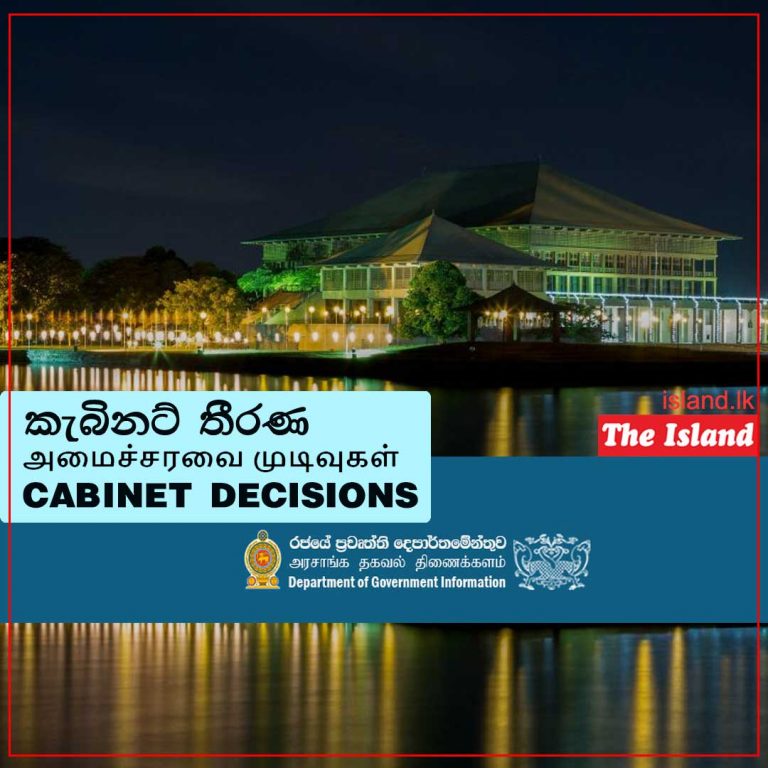
Approval of the Cabinet of Ministers has been granted at their meeting held on 19.05.2025 in order to introduce amendments to the Inland Revenue Act No. 24 of 2017 including the proposed tax revisions to enhance the tax structure paving way for state financial integrity based on revenue.
Accordingly, the revised draft bill has been prepared by the legal draftsman and clearance of the Attorney General has been received.
Therefore, the Cabinet of Ministers has granted approval for
the resolution furnished by the President in his capacity as the Minister of Finance, Policy Planning and Economic Development to publish the aforementioned draft bill in the government gazette notification and subsequently, forward the same to the Parliament for its concurrence.
News
Cabinet nod for “National Mineral Policy” – 2026
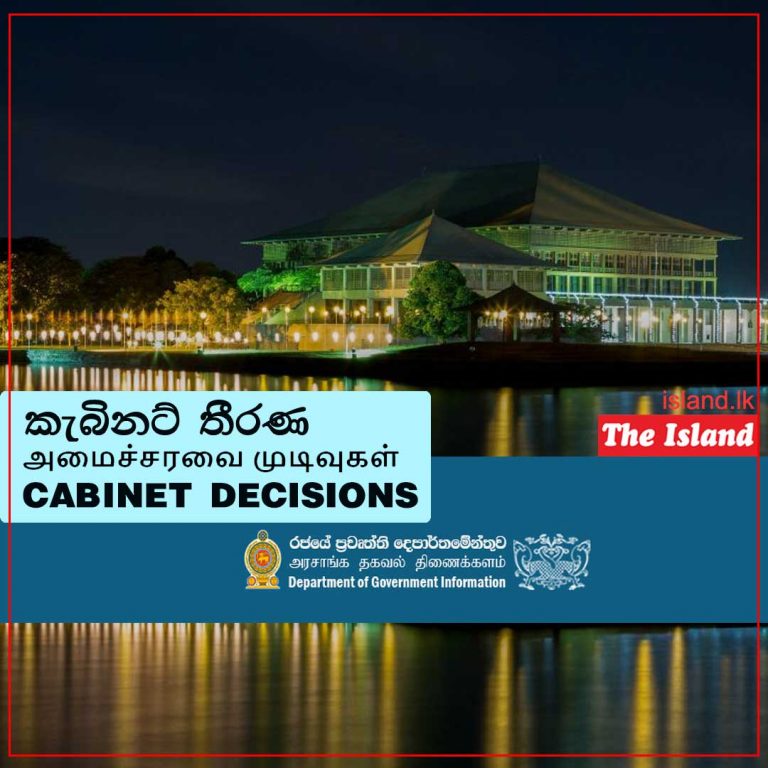
The National Mineral Policy was prepared for the first time in the year 1999, and the aforementioned policy has been amended in 2023 to cover matters such as preparing an updated data system related to mineral resources, adding value to the export of minerals, encouraging mineral-related industrialists, extracting mineral resources and managing the environment sustainably, and resolving the issues related to the ownership of the land arising in extracting mineral resources.
The revised National Mineral Policy has been reupdated in line with the manifesto “A Sustainable Resource Utilization – Generation of the Highest Benefit” under the policy statement of the current government” A Thriving Nation – A Beautiful Life.”
Accordingly, the Cabinet of Ministers has approved the resolution presented by the Minister of Industries and
Entrepreneurship to implement the so-formulated “National Mineral Policy—2026.”
Latest News
Twelve sentenced to death by Gampaha High Court

The Gampaha High Court has sentenced Twelve (12) individuals to death over the 2022 murder of former Polonnaruwa District Member of Parliament Amarakeerthi Athukorala and his security officer.
-

 Features4 days ago
Features4 days agoMy experience in turning around the Merchant Bank of Sri Lanka (MBSL) – Episode 3
-

 Business5 days ago
Business5 days agoZone24x7 enters 2026 with strong momentum, reinforcing its role as an enterprise AI and automation partner
-

 Business4 days ago
Business4 days agoRemotely conducted Business Forum in Paris attracts reputed French companies
-

 Business4 days ago
Business4 days agoFour runs, a thousand dreams: How a small-town school bowled its way into the record books
-

 Business4 days ago
Business4 days agoComBank and Hayleys Mobility redefine sustainable mobility with flexible leasing solutions
-

 Business5 days ago
Business5 days agoHNB recognized among Top 10 Best Employers of 2025 at the EFC National Best Employer Awards
-

 Editorial7 days ago
Editorial7 days agoAll’s not well that ends well?
-

 Business5 days ago
Business5 days agoGREAT 2025–2030: Sri Lanka’s Green ambition meets a grid reality check


